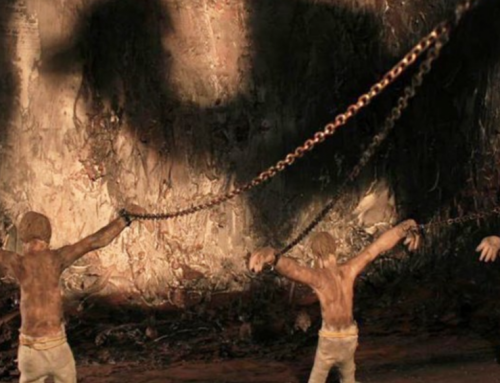Egregious behavior by hollow, narcissistic leaders like Stumpf and Trump is, unfortunately, in the DNA of homo sapiens
Four things you might not know
- The root cause of the behavior of bankers and corporate leaders is directly linked to the scientific findings by Charles Darwin in The Descent of Man and reinforced today by Edward O. Wilson in The Social Conquest of Earth (2012).
- Donald Trump’s German ancestor’s family name was Drumpf, changed in 1648 to Trump.[1] But the connection between Stumpf and Drumpf is not in name-rhyme or kin selection, it’s in the genetics of “individual and group selection.”
- Wells Fargo and its Ex-CEO John Stumpf are the tip of a scandalous bank iceberg, selling services to people who don’t want or need them. 7 of 10 Americans (69%) have less than $1,000 in their savings accounts and half have zero in their retirement savings. And Canadians are in the same boat. What people don’t need is the cost of an extra bank account, let alone an unsolicited credit card.
- The now “retired”/fired Stumpf will forfeit $41 million in pay, which is a paltry pinch in his wallet compared to what he made. He was the highest paid banker in 2015 at $19.3 million.
(7 minute read)
Are people innately good, but corruptible by the forces of evil? Or, are they instead innately wicked, and redeemable only by the forces of good? People are both. And so it will forever be unless we change our genes, because the human dilemma was foreordained in the way our species evolved, and therefore an unchangeable part of human nature. – Edward O. Wilson, The Social Conquest of Earth [2]
Most of us are appalled when so-called leaders like John Stumpf, Wells Fargo CEO, demonstrate a level of selfishness, greed, arrogance and audacity that boggles any sense of human morality. How can someone rationalize receiving exorbitant amounts of money while knowing two million ordinary people are being manipulated and bilked, a fraud from which Stumpf, and others, benefited directly?
Do the minds of people perched-at-the-top-of-human-tribes not think of the inherent “wickedness” in what they do? Do they not see the direct correlation between their excess and the privation of others? Do they not relate to other members of the human tribe? No! No! And no!
The answer to why leaders behave insidiously – ruthlessly, pathologically, criminally – lies in the understanding of human biology. Their behavior is rooted in their genes and their emotional circuitry. And, unfortunately for our species, it is not likely fixable, as Edward Wilson says, “unless we change our genes …” In short, such behavior by leaders will not adapt in our life time or the lifetimes of our children, grandchildren and great grandchildren. It’s an evolutionary problem. But they’re still our progenies. If we don’t start now to develop a genetic mutation we are, well … on a slippery slope to extinction, in evolutionary metrics.
At the present time, we are fundamentally the same as our hunter-gatherer ancestors, but with more food and larger territories. – Edward O. Wilson
Edward Wilson, winner of two Pulitizer Prizes, professor emeritus at Harvard and one of the world’s preeminent biologists, has spent a career researching and explaining “the origins of the human condition.” In 2012, he added to his extraordinary oeuvre The Social Conquest of Earth. According to Jennifer Schuessler of the New York Times, “A sweeping account of the human rise to domination of the biosphere….”
Wilson posits, convincingly, that much of human behavior can be explained by biology, and since 1978 when he published his Pulitzer Prize winning On Human Nature, he has argued that all the social sciences are anchored in biology – what he calls sociobiology (sometimes called evolutionary psychology) – and biology and culture go hand in hand at forming human nature. Also, the research and thinking of Richard Dawkins, renowned ethologist and evolutionary biologist, aligns with the thesis that evolutionary biology and cultural development are like Siamese twins. In his bestselling book, The Selfish Gene, Dawkins describes the competitive nature of genes in their own battle for survival and how this is passed on from person to person. Dawkins says that biological evolution is much slower than cultural evolution but they both follow a pattern of “inheritance of acquired characteristics.” For example, culturally, most of us inherit much from our parent’s belief systems whether it be religion, social behavior or a favorite sports team. We inherit, biologically, the behavioral means of social organization, thus carrying forward the fundamental behavior of our distant ancestors. In biology, this inherited social organization, hierarchy and pattern of behavior is called eusociality. Wilson says it drives human behavior and that even cultures are predisposed to genetics: “… genes hold culture on a leash.”
There are some common principles that apply to the human species:
- Human nature is a result of adaptation – Darwin’s findings and many since in the fields of anthropology and psychology, are, today, universally accepted.
- Human cognitive capabilities are a result of natural selection and sexual reproduction over eons. And yet, despite a couple of million years of growth and a tripling of our brain size, our cognitive processing remains subjugated to our ancient animal instincts and emotions (see earlier blog: America, please vote with your prefrontal cortex, not your amygdala).
- As Wilson states, natural selection favors the genetic, selfish strength of the individual over the group, but “More importantly, group selection is clearly the process responsible for advanced social behavior.”[3] This never-ending conflict between selfish individual behavior and altruistic group behavior has, so far, been “won” by the selfish individual – the Stumpfs and Drumpfs.
If we recognize this evolutionary reality then we have an opportunity to intelligently and objectively analysis why we behave the way we do. To see why selfish leadership is the norm, not the exception and recognize what we call leadership is, in fact, stuck in the Stone Age. If we can make this shift in perspective then we have a chance to address the root cause of flawed leadership instead of dabbling with the symptoms, throwing endless programmatic theories and practices at it (i.e., organizational development, leadership training, executive coaching and a dumpster full of leadership books).
Darwinism and sociobiology are not explanations for rationalizing bad leadership behavior and predatory capitalism, they are a foundation on which to build a better understanding of the problem. As Albert Einstein said when asked how he would solve a problem if he had ten days: “I’d spend nine days on the problem and one day on the solution.”


Back to banking
Why would John Stumpf think it was morally and ethically okay to sell unwanted services to two million unknowing customers while watching the value of his stock increase by $200 million? The reality is – and Stumpf should know this – 7 of 10 Americans (69%) have less than $1,000 in their savings accounts and half have zero in their retirement savings. What they don’t need are more accounts, credit cards and costs for services? But their needs don’t matter because they are outside Stumpf’s small band within the larger human tribe. His tribe is made up of crony executives and shareholders and that’s who Stumpf was serving while pocketing an annual income of $19.3 million in 2015.
Stumpf and his executives came up with a program to increase the average number of accounts per customer because that was an indication of future financial growth in the banking business. The sector averages three accounts per customer but greedy Stumpf was stumping for eight. The rallying call was, “Eight is Great.” Stock went up and Stump’s stock value increased by $200 million. But after years of complaints the tribal crap hit the fan. Congress investigated, Stumpf was fired. As a sidebar, Warren Buffett lost a few hundred million. Berkshire Hathaway was the largest Wells Fargo stockholder, holding 480 million shares, about 10%.
Alarms raised in 2005, New York Times: “Everybody knew there was fraud going on, and the people trying to flag it were the ones who got in trouble,” said an ex-branch manager who was fired.
Stumpf and Trump and such behavior are the product of two things: evolutionary biology and cultural evolution – as explained by Wilson and Dawkins in much greater depth than we can do here – which together fosters the socio-economic acceptance of such rapacious behavior.
Together they have created the conflict between the poorer and the better angels of our nature. – Edward O.Wilson
If we look at the current dearth of corporate and political leadership through the lens of sociobiology, it raises questions fundamental to self-understanding, and pervasive misunderstanding, of modern-day leadership:
- Is the selfish behavior of leaders (narcissism, greed, manipulation, will to power) inherited through evolutionary biology? Wilson: He states that the behavior of today’s leaders is a direct outcome of human genetic evolution with the strongest leaders competing within their group for primacy and the groups competing against each other … and group selection [not individual] being the driving force of where we have been and where we are going.”[3] “Without doubt, a group of smart prehumans could defeat and displace a group of dumb, ignorant prehumans as true then as it is today for armies, corporations and football teams.”[4]. In short: Altruistic, cooperative groups are the only way to overcome selfish individual behavior and groups dominated by selfish individuals. (Just listen to this video on how the replacement CEO at Wells Fargo is rationalizing Stumpf’s behavior).
- Can the evolutionary good of the group supersede the genetically coded selfishness of individual leaders? Wilson: Natural selection at the individual level has prevailed throughout the history of life … Group selection must be exceptionally powerful to relax the grip of individual selection and introduce highly cooperative behavior into the physiology of the group members.”[5] In short: That’s a maybe, requiring a massive group effort, often pitting the have-nots against the haves, the 99% against the 1%.
- Is it possible to change the human genetic predisposition that is selfish and “innately wicked?” Wilson: An iron rule exists in genetic social evolution. It is that selfish individuals beat altruistic individuals, while groups of altruists beat groups of selfish individuals [6] … Individual selection is responsible for much of what we call sin, while group selection is responsible the greater part of virtue. Together they have created the conflict between the poorer and the better angels of our nature.[7] If individual selection were to dominate, societies would dissolve. If group selections were to dominate, human groups would come to resemble ant colonies – the majority prevail and prosper.[8] In short: If we humans do not learn to cooperate like groups of ants our societies will dissolve under the selfishness and greed of the Stumpfs and Drumpfs.
- Can we change our social organizations to protect the group from individualistic selfish behavior, thereby, achieving highly cooperative behavior for the betterment of civilization? Wilson: “Our instincts remain unprepared for civilization … Through it all our instincts remain in command and confuse, but a few among them, if we obey them wisely, may save us. For example, we feel empathy … [and are beginning] to see how the impulses of morality might work inside the brain … and how the Golden Rule is fundamental to all moral reasoning.“[9] In Short: Our individual selfish instincts might be overcome by other instincts like empathy. But that’s a maybe. [There is an expansive book by Jeremy Rifkin, The Empathic Civilization that addresses our evolutionary empathy and its power to save the species.]
We cannot do justice to Edward Wilson’s thinking in this space so in depth answers to these questions are best explored by reading The Social Conquest of Earth. And perhaps On Human Nature, The Selfish Gene and The Empathic Civilization. (The first three of these books should be on the list of the most important books of the last 100 years, providing more insight and learning about leadership – and the lack thereof – than any of the hundreds of current tomes (see earlier blog, Ten leadership books most leaders probably haven’t read, but should).
We have created a Star Wars civilization with Stone Age emotions, medieval institutions and god-like technology. We thrash about. We are terribly confused by the mere fact of our existence, and a danger to ourselves and to the rest of life. – Edward O. Wilson
The leadership maze

The real history of man is not in prices and wages, nor in elections and battles, nor in the even tenor of the common man; it is in the lasting contributions made by geniuses to the sum of human civilization and culture. – Will Durant, historian (1900-1981)
If we are smart, we can see Strumpf and Trump as society’s canaries in the mine shaft or, if you prefer, rats in the maze, demonstrating the fundamental flaw in human behavior, which has trapped leaders and tribes since civilization began. Science, specifically sociobiology, has confirmed that when individuals are in a position of power in a group the genetically, selfish individual dominates, suppressing genetically altruistic group behavior, thereby, pushing all tribes toward the evolutionary decline of the species. For example, it’s why climate change is either denied or ignored by politicians and corporate leaders. Because the power of their selfish DNA trumps the collective power and best interests of the whole tribe and its distant descendants.
Homo sapiens are at an embryonic stage in human evolution and we still have very little self-understanding of who we are and why we behave as we do. What we do know is that we have behaved badly for millennia and that the only leadership that has advanced our species in any enduring way is the innate genius of a small handful of humans. Nothing else. Although genius is a double-edge sword (from weapons of mass destruction and pollution to Mandela’s apartheid and Fleming’s penicillin), it is not part of the current definition of leadership. The vast majority of today’s leadership is, in fact, stuck in the genetic reality of our historic, tribal behavior, encumbered from any meaningful advancement.
We can change, but only when a group’s genetic altruistic selection is strong enough to overcome the group’s submission to the selfish individuals who dominate the tribe. Wilson says we’re stuck, “unless we change our genes, because the human dilemma was foreordained in the way our species evolved.” However, he contends we can change “by the twenty-second century … at least strong beginnings” by building groups and cultures on a foundation of altruistic leaders rather than selfish ones. And that transformation from self-centered leaders to altruistic leaders has to begin with character.
Character is destiny. – Heraclitus (535-475 BCE)
Until our societies (from the small bands of elites to the whole tribe) place a leader’s character above all else and demand that it is the number one criteria for leadership, we cannot expect to initiate a genetic adaptation that can, over time, stanch the downward evolutionary trajectory of the human species.
“We humans are capable of greatness … but we are making a mess of our planet and becoming a danger to ourselves.” – Carl Sagan (1934-1996) American astrophysicist
Footnotes:
- The Making of Donald Trump, David C. Johnston, Chapter 1
- The Social Conquest of Earth, Chapter 24, The Origins of Morality and Honor, p. 241
- Ibid, Chapter 27, p. 289
- Ibid, Chapter 4, p.44
- Ibid, Chapter 5, p. 55
- Ibid Chapter 24, p. 243
- Ibid, p. 241
- Ibid, p. 243
- Ibid, Chapter 24, p. 244-245Are Stumpf and Trump biologically connected? https://straightspeak.com/2016/10/are-stumpf-and-trump-biologically-connected/ Share on X







Leave A Comment